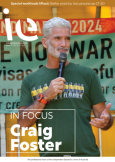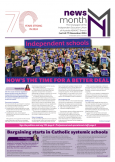
IEUA NSW/ACT Branch Secretary Carol Matthews and NSW MPSally Quinnell, Labor member for Camden.
NSW MP Sally Quinnell, Labor member for Camden, addressed the IEU’s AGM on 26 October. She spoke about her career as a music teacher before entering NSW Parliament, and delivered a speech on behalf of the NSW Deputy Premier and Minister for Education, Prue Car. Below is an extract from her address.
“Until March of last year, I was a classroom music teacher and I’ve been a proud member of various teachers’ unions since I started teaching in 2001,” Quinnell said.
“I’m a proud product of independent and systemic education – I was a music teacher in the private sector, the Catholic systemic sector and the public sector, and I’ve taught students from prep through to year 12. I’ve also run a business as a music educator.”
Message from Education and Early Learning Minister Prue Car
On behalf of the Deputy Premier and Minister for Education Prue Car, Sally Quinnell said: “Our government promised that you as teachers would be valued as the true professionals you are, that we would show you the respect you deserve. So today, I want to speak directly to you in outlining a significant step we are taking to restore that trust and to demonstrate our respect for you.
“Professional development has always been at the heart of your practice. Even before it became mandatory, it was simply what teachers did. As the architects of learning, you are the experts in identifying the tools and resources you need.
“Professional development should not be about ticking boxes. It should actually be about adding value to your practice and the impact you have on your students. It should bring value to your classrooms.
“But unfortunately, like many things that happened in education over the past decade, the value of professional development was eroded. It became overly restrictive. Instead of supporting you, it imposed burdensome constraints that added workload pressures. And it detracted from the focus on actual learning and development.
“It meant that so much of the valuable professional development that was relevant to your individual needs and enhanced practice could not actually be counted, meaning all of you are, no doubt, doing far more than the 100 hours of PD that is required.
“So we are removing those restrictive professional development requirements. There will no longer be categories of accredited and elective PD.
“We are trusting teachers to choose the professional development that suits their needs. In short, we are respecting you as the professionals you are.
“Under the changes we are making, teachers will now be able to identify their own PD activities, as long as it aligns to one of the seven professional standards – not the 37 standard descriptors, but the seven Australian Professional Standards for Teachers. What this means is we are scrapping the requirement for 50 of your 100 hours to be accredited to PD in mandatory priority areas.
“On top of this, teachers will also be able to count any compliance training towards the 100 hours, as long as it aligns to the standards.
“The other big change is that teachers will no longer have to write lengthy and time-consuming evaluations for the PD you complete. All that will be required is a record of the PD you undertake.
“However, there will still be some oversight and guidance from NESA. We do need to ensure that there will be a level of accountability in the quality of PD that is being undertaken. There will be a framework that will support teachers in identifying effective PD. There will also be a list of recognised PD providers, which will act as a guide for teachers, and will be overseen by an expert advisory panel.
... “We would expect to see in the coming year, a focus on the new curriculum rollout as it comes into effect, and I know the independent and Catholic systems will have clear expectations for teachers in those sectors.
“The changes we are making are probably the most significant reforms to professional development in NSW in 20 years, they bring NSW back in line with the rest of the country, and ensure that every hour of professional development you do is relevant and valuable – valuable to you and to your practice, and valuable to your students.”











































































































































